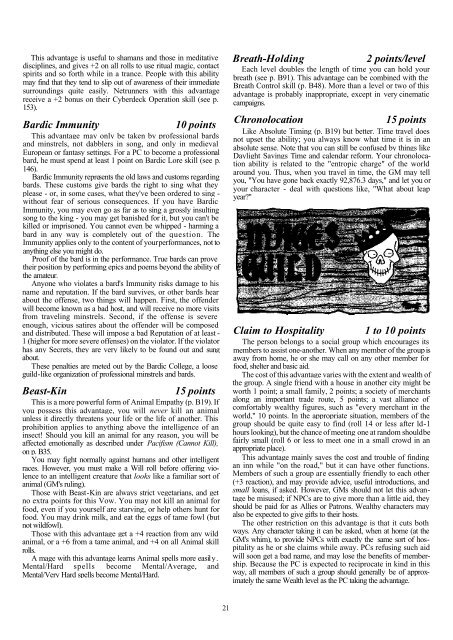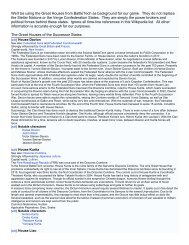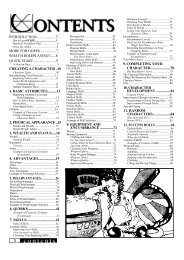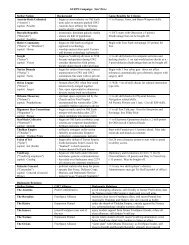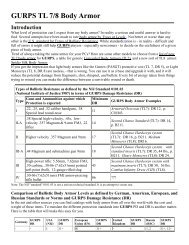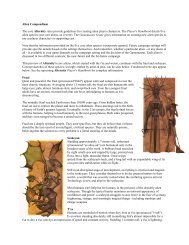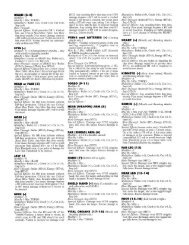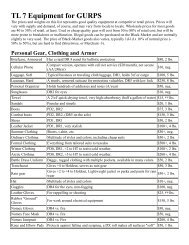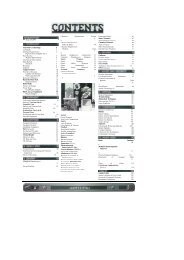GURPS - Compendium 1..
GURPS - Compendium 1..
GURPS - Compendium 1..
You also want an ePaper? Increase the reach of your titles
YUMPU automatically turns print PDFs into web optimized ePapers that Google loves.
This advantage is useful to shamans and those in meditative<br />
disciplines, and gives +2 on all rolls to use ritual magic, contact<br />
spirits and so forth while in a trance. People with this ability<br />
may find that they tend to slip out of awareness of their immediate<br />
surroundings quite easily. Netrunners with this advantage<br />
receive a +2 bonus on their Cyberdeck Operation skill (see p.<br />
153).<br />
Bardic Immunity<br />
10 points<br />
This advantage may only be taken by professional bards<br />
and minstrels, not dabblers in song, and only in medieval<br />
European or fantasy settings. For a PC to become a professional<br />
bard, he must spend at least 1 point on Bardic Lore skill (see p.<br />
146).<br />
Bardic Immunity represents the old laws and customs regarding<br />
bards. These customs give bards the right to sing what they<br />
please - or, in some cases, what they've been ordered to sing -<br />
without fear of serious consequences. If you have Bardic<br />
Immunity, you may even go as far as to sing a grossly insulting<br />
song to the king - you may get banished for it, but you can't be<br />
killed or imprisoned. You cannot even be whipped - harming a<br />
bard in any way is completely out of the question. The<br />
Immunity applies only to the content of your performances, not to<br />
anything else you might do.<br />
Proof of the bard is in the performance. True bards can prove<br />
their position by performing epics and poems beyond the ability of<br />
the amateur.<br />
Anyone who violates a bard's Immunity risks damage to his<br />
name and reputation. If the bard survives, or other bards hear<br />
about the offense, two things will happen. First, the offender<br />
will become known as a bad host, and will receive no more visits<br />
from traveling minstrels. Second, if the offense is severe<br />
enough, vicious satires about the offender will be composed<br />
and distributed. These will impose a bad Reputation of at least -<br />
1 (higher for more severe offenses) on the violator. If the violator<br />
has any Secrets, they are very likely to be found out and sung<br />
about.<br />
These penalties are meted out by the Bardic College, a loose<br />
guild-like organization of professional minstrels and bards.<br />
Beast-Kin<br />
15 points<br />
This is a more powerful form of Animal Empathy (p. B19). If<br />
you possess this advantage, you will never kill an animal<br />
unless it directly threatens your life or the life of another. This<br />
prohibition applies to anything above the intelligence of an<br />
insect! Should you kill an animal for any reason, you will be<br />
affected emotionally as described under Pacifism (Cannot Kill),<br />
on p. B35.<br />
You may fight normally against humans and other intelligent<br />
races. However, you must make a Will roll before offering violence<br />
to an intelligent creature that looks like a familiar sort of<br />
animal (GM's ruling).<br />
Those with Beast-Kin are always strict vegetarians, and get<br />
no extra points for this Vow. You may not kill an animal for<br />
food, even if you yourself are starving, or help others hunt for<br />
food. You may drink milk, and eat the eggs of tame fowl (but<br />
not wildfowl).<br />
Those with this advantage get a +4 reaction from any wild<br />
animal, or a +6 from a tame animal, and +4 on all Animal skill<br />
rolls.<br />
A mage with this advantage learns Animal spells more easily.<br />
Mental/Hard spells become Mental/Average, and<br />
Mental/Very Hard spells become Mental/Hard.<br />
Breath-Holding<br />
2 points/level<br />
Each level doubles the length of time you can hold your<br />
breath (see p. B91). This advantage can be combined with the<br />
Breath Control skill (p. B48). More than a level or two of this<br />
advantage is probably inappropriate, except in very cinematic<br />
campaigns.<br />
Chronolocation<br />
15 points<br />
Like Absolute Timing (p. B19) but better. Time travel does<br />
not upset the ability; you always know what time it is in an<br />
absolute sense. Note that you can still be confused by things like<br />
Daylight Savings Time and calendar reform. Your chronolocation<br />
ability is related to the "entropic charge" of the world<br />
around you. Thus, when you travel in time, the GM may tell<br />
you, "You have gone back exactly 92,876.3 days," and let you or<br />
your character - deal with questions like, "What about leap<br />
year?"<br />
Claim to Hospitality<br />
1 to 10 points<br />
The person belongs to a social group which encourages its<br />
members to assist one-another. When any member of the group is<br />
away from home, he or she may call on any other member for<br />
food, shelter and basic aid.<br />
The cost of this advantage varies with the extent and wealth of<br />
the group. A single friend with a house in another city might be<br />
worth 1 point; a small family, 2 points; a society of merchants<br />
along an important trade route, 5 points; a vast alliance of<br />
comfortably wealthy figures, such as "every merchant in the<br />
world," 10 points. In the appropriate situation, members of the<br />
group should be quite easy to find (roll 14 or less after ld-1<br />
hours looking), but the chance of meeting one at random should be<br />
fairly small (roll 6 or less to meet one in a small crowd in an<br />
appropriate place).<br />
This advantage mainly saves the cost and trouble of finding<br />
an inn while "on the road," but it can have other functions.<br />
Members of such a group are essentially friendly to each other<br />
(+3 reaction), and may provide advice, useful introductions, and<br />
small loans, if asked. However, GMs should not let this advantage<br />
be misused; if NPCs are to give more than a little aid, they<br />
should be paid for as Allies or Patrons. Wealthy characters may<br />
also be expected to give gifts to their hosts.<br />
The other restriction on this advantage is that it cuts both<br />
ways. Any character taking it can be asked, when at home (at the<br />
GM's whim), to provide NPCs with exactly the same sort of hospitality<br />
as he or she claims while away. PCs refusing such aid<br />
will soon get a bad name, and may lose the benefits of membership.<br />
Because the PC is expected to reciprocate in kind in this<br />
way, all members of such a group should generally be of approximately<br />
the same Wealth level as the PC taking the advantage.<br />
21


